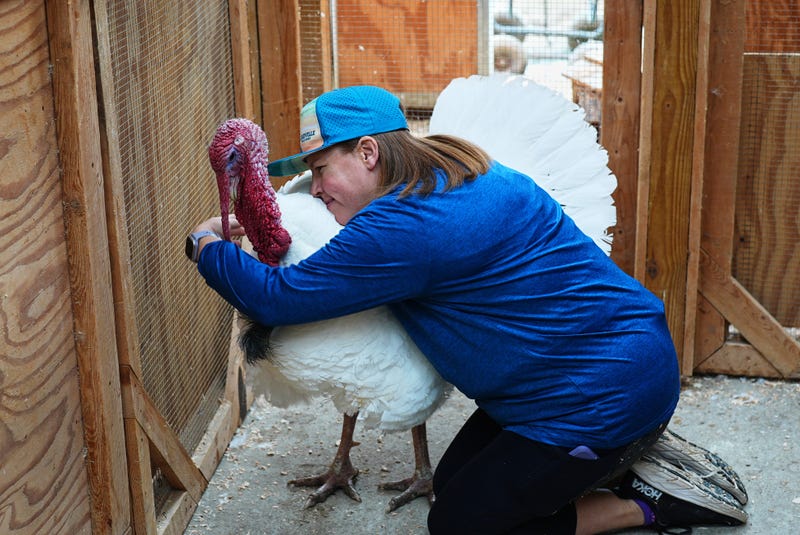
ERIE, Colo. (AP) — “Gus” the turkey has been spending Thanksgiving week much differently than millions of other unlucky gobblers across the U.S.
As he trots in a sprawling animal sanctuary on the Colorado plains, he is stopped every few steps by staff who pet him, hug him or even give him a peck on his red face. Gus has been there since 2023 after being pardoned by the governor.
“What do you think? Do you want to do snuggles today?” Lanette Cook, education and engagement manager at the Luvin Arms Animal Sanctuary in Erie, says to Gus.
Gus is among a growing number of turkeys that are being “adopted” instead of being covered in gravy and eaten at Thanksgiving dinner tables.
An increasing number of farm animal sanctuaries across the country have started promoting this alternative version of Thanksgiving in which families “adopt” turkeys and donate money to their lifelong care. In return, they receive photos, certificates and sometimes even one-on-one visits with the birds.
The goal: Spare a few of the tens of millions of turkeys slaughtered this time of year, many of which are raised in what animal rights advocates say are inhumane conditions in factory farms.
Some people will adopt for themselves and feature their turkey’s photo on their Thanksgiving table, while others will gift the adoptions to friends or family members.
At Luvin Arms, a $25 donation comes with a certificate, photo and either a virtual or in-person visit, explained Kelly Nix, its executive director. Since launching the program in 2022, the sanctuary, located about 25 miles (40 kilometers) north of Denver, has seen the number of sponsorships double every year. And this year they’re on track to reach their goal of $18,000, she said.
Luvin Arms' website features Gus and a gaggle of turkeys along with their personality traits (Gus is very talkative!) as part of its sponsor-a-turkey program. It encourages the public to donate for the birds for Thanksgiving and maybe even rethink their holiday traditions.
The funds have helped pay for extending the turkeys’ outdoor pasture area, along with feeding and rescuing more turkeys. They've helped with veterinary bills, which can sometimes cost thousands of dollars because of the medical complications that arise for turkeys that come from factory farms, which breed them to grow very big in a short period of time, said Nix. In the wild, turkeys tend to live an average of three or four years, according to the National Wild Turkey Federation.
But the sanctuary says the program is about more than just the turkeys or money. There’s also an important educational factor, whether learning about the conditions in factory farms or that turkeys are more than just centerpieces.
“Even if it makes you stop and double think what it is you’re about to do,” said Nix. “Or that you’re like, ‘wow this is a life of a sentient being,’ for us that’s a conversation starter.”
Farm Sanctuary, which is located in New York and California, is believed to be the first to launch this type of turkey adoption program, kicking it off in 1986. Gene Baur, its president and co-founder, said initially the public was not only confused about the program but about the concept of rescuing farm animals altogether.
In the nearly four decades since, the sanctuary has rescued thousands of turkeys. And the public has not only caught on to the concept but in some years has donated hundreds of thousands of dollars, Baur said.
“We grow up with certain traditions. But just because something is a tradition doesn’t mean that it needs to remain as a tradition,” said Baur.
Barn Sanctuary has had a similar program since 2023 in Chelsea, Michigan. Chase DeBack, its advocacy, education and engagement coordinator, said it’s about shining a more positive light on the birds and their distinct personalities.
He rattles off some of the organization's residents like they're close friends: Lewis isn't much of a people person but loves spending times with the girls. Sabrina and Hilda are always interested in what people are bringing into the coop and what everyone's doing.
“You only hear about kind of the dead turkeys," said DeBack. "And so we really wanted to shine a light on the unique personalities that turkeys have and how loving and caring they are for humans and for each other.”
___
Golden reported from Seattle.